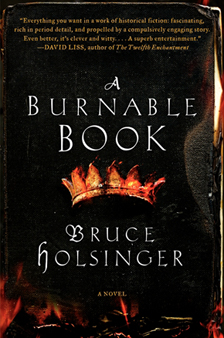By kingmaker’s cunning
by Bruce HolsingerWe all have difficult friendships.
While our friendships can be sources of sustenance and joy, they can also be full of petty jealousies, professional rivalries, and personal slights real or perceived. One such difficult friendship is at the centre of my new novel, a historical thriller set in late medieval England.
The friends? Geoffrey Chaucer, the greatest English poet of the Middle Ages; and John Gower, his more obscure contemporary. The novel begins and ends with the personal and professional relationship between these two writers while exploring the darker side of literary friendship.
A Burnable Book takes place in and around London in the spring of 1385. It’s about murder, love, war, conspiracy, London prostitutes and Italian mercenaries – and a book, a manuscript that goes missing before the story begins. No one knows who wrote this book, where it came from, or where it is, but everyone wants to find it, and much of the story involves the search for the manuscript through the streets of London, Southwark and Westminster.
A Burnable Book, then, is a book about books, and it draws on historical information about medieval manuscripts, copyists, poetry, book binding and so on to flesh out the story. One of the first things I did when I began the book was to write several of the poetic prophecies, which foretell the deaths of England’s kings since the Norman Conquest. As the novel unfolds they appear as both written and oral forms of poetry: recited by a preacher, played by street mimes, memorised and recalled by friars, and circulating in multiple copies.
Here is the final prophecy, which foretells the death of the current king, Richard II.
At Prince of Plums shall prelate oppose
A faun of three feathers with flaunting of fur,
Long castle will collar and cast out the core,
His reign to fall ruin, mors regis to roar.
By bank of a bishop shall butchers abide,
To nest, by God’s name, with knives in hand,
Then springen in service at spiritus sung.
In palace of prelate with pearls all appointed,
By kingmaker’s cunning a king to unking,
A magnate whose majesty mingles with mort.
By Half-ten of Hawks might shender be shown.
On day of Saint Dunstan shall Death have his doom.
Much of the story told in A Burnable Book concerns the deciphering of this prophecy and the hunt for the manuscript through the streets and alleys of London. There are a number of subplots involving butchers, prostitutes, mercenaries and bishops, among others. The cast of characters includes a list of prominent historical figures (John of Gaunt, Katherine Swynford, and even Richard II) as well as humbler folks from London’s underworld. One of them is Eleanor or Edgar Rykener, a character based closely on John Rykener, a transvestite prostitute active in Oxford and London in the 1390s.
The novel’s two central characters, though, are poets and friends: John Gower, the protagonist and a notorious trader in information, who’s slowly losing his vision; and Geoffrey Chaucer, who commissions Gower at the beginning of the novel to track down the manuscript – the ‘burnable book’ of the novel’s title. Gower was a trilingual poet and chronicler who moved in many of the same social and institutional circles as Chaucer: servants of the crown, the minor nobility, and the city bureaucracy of London. But we know a lot less about Gower’s biography than we do about Chaucer’s. He seems to have made less of a bureaucratic mark on his world, and we don’t even know what if anything he did for a living, though it’s clear he was a man of considerable wealth. He lived in a house let from the Augustinian priory of St Mary Overeys near the foot of London Bridge in the town of Southwark, which wasn’t actually part of London. The unending tensions between London and the disordered suburb across the bridge must have figured importantly in his life, just as it informs his poetry.
We know about Gower’s long-lasting and probably uneasy friendship with Chaucer from a number of sources, most famously from a stanza near the end of Chaucer’s Troilus and Criseyde (the poem that was Shakespeare’s model for Troilus and Cressida). In these lines, Chaucer dedicates his great poem to two of his friends (and this is the original Middle English):
O moral Gower, this book I directe
To thee, and to thee, philosophical Strode,
To vouchen sauf, ther nede is, to corect
Of your benignitees and zeles gode.
To translate: “O moral Gower, this book I direct to you, and to you, philosophical Strode, to approve, and, where there is need, to correct in your benignity and good zeal.” The man named in the second line is Ralph Strode, who was an Oxford theology professor and, later in his career (during the period in which the novel is set), the Common Serjeant of London, representing the city in the king’s courts and responsible for the welfare of the city’s orphans.
Gower reciprocated Chaucer’s literary benediction at the end of his great English poem Confessio Amantis, in a series of lines Gower puts in the voice of Love:
And gret wel Chaucer whan ye mete,
As mi discipline and mi poete:
For in the floures of his youthe
In sondri wise, as he wel couthe,
Of Ditees and of songes glade,
The whiche he for mi sake made,
The lond fulfild is overal:
Translation: “And give a fair greeting to Chaucer when you meet, as my discipline and my poet; for in the flower of his youth he made lyrics and songs for my sake – in various ways and as he was able – that now fill the land everywhere.” This exchange of addresses is one of many such moments of poetical banter between the two men, leading scholars to assume that their friendship was a close and enduring one.
Yet all friendships have their darker sides. Chaucer and Gower both enjoyed long careers as poets, and each of them lived during a time of social unrest and political turbulence that demanded flexible loyalties and strategic forms of communication, whether in verse or otherwise. Chaucer was the controller of the wool custom, a justice of the peace, a member of parliament, and a devoted Londoner who lived for years above Aldgate along the city walls. And his political life was hardly confined to England: one of Chaucer’s life records is a document giving Gower power of attorney over his affairs during a diplomatic trip to Italy in 1378 – the purpose of which remains a mystery. Likewise, Gower wrote his Confessio Amantis at King Richard II’s behest, so he claims, yet by the end of his literary career had shifted his loyalties to the Lancastrian faction – and he even rewrote the ending of the Confessio Amantis to obscure his personal and literary ties to Chaucer.
Court politics, town-crown conflict, bureaucratic infighting, and literary rivalry: hardly a recipe for an uncomplicated friendship! While trying to reimagine the relationship between these two medieval writers was an intellectual challenge, it was also a creative pleasure. The exact nature of the friendship between Geoffrey Chaucer and John Gower will always remain a mystery, of course – and A Burnable Book wouldn’t have it any other way.
Bruce Holsinger is an award-winning scholar of the medieval period and Professor of English at the University of Virginia in Charlottesville. His debut historical thriller A Burnable Book is published by HarperCollins in the UK and by William Morrow in the US and Canada.
“Holsinger’s research, alongside the energetic vulgarity of a language in flux, delivers up a world where even the filth is colorful.”
Sarah Dunant, The New York Times Book Review
bruceholsinger.com



